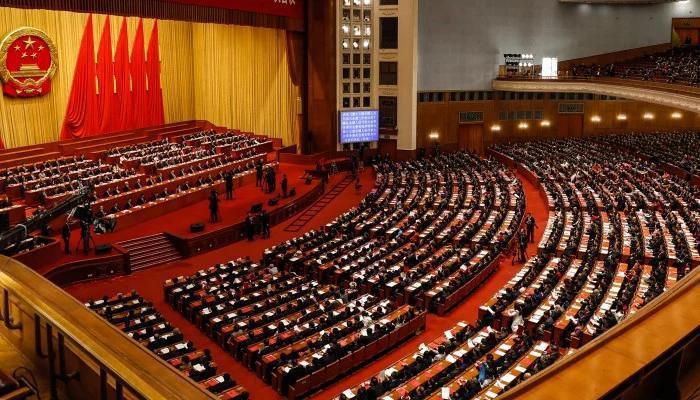BEIJING, June 18 (CNA) - The top decision-making body of China's parliament will review a draft of the national security legislation for Hong Kong during a session in Beijing that began on Thursday (Jun 18), the official Xinhua news agency reported.
The draft was submitted on Thursday to the Standing Committee of National People's Congress, which meets until Saturday, according to Xinhua.
The draft legislation provides the specifics and definitions of four crimes: Separatist activity, state subversion, terrorist activity and collusion with foreign forces, Xinhua reported.
It also sets out punishments for those crimes, it said.
The law is expected to bring about the most profound change to the former British colony's way of life since it returned to Chinese rule in 1997. It is expected to allow Chinese security agents to be based in Hong Kong for the first time.
The time frame for introducing the law is unclear, although some political analysts expect it will come in July, ahead of key elections in September.
Critics fear the legislation will crush wide-ranging freedoms in Hong Kong denied to people in China that are seen as key to its success as a global financial centre.
Hong Kong pro-democracy lawmaker Dennis Kwok said the new law would "severely undercut" Hong Kong people's basic rights and freedoms, and wondered whether meeting foreign officials would count as colluding with foreign forces.
"At the end, this national security law is not really about national security but really about silencing opposition. That's our worst fear and biggest fear," said Kwok.
"I am very worried that the scope of 'collusion' will be unlimited in the upcoming national security law, and even allow (for) cooking up charges," said Tanya Chan, another prominent pro-democracy lawmaker.
According to the draft proposal, the law will also allow mainland security organs to openly establish a presence in Hong Kong, but the scope of their enforcement powers is yet to be revealed.
The city's sole representative to Beijing's top lawmaking body, Tam Yiu-chung, said on Wednesday that the law could allow for extraditions to the mainland - the topic that triggered last year's protests.
Chinese Vice Premier Liu He sought on Thursday to reassure the concerns of the business community, saying that the central government will adhere to One Country, Two Systems and "effectively protect the rights and interests of enterprises and investors in Hong Kong".
Authorities in Beijing and Hong Kong have dismissed fears the law will curb freedoms and say it will only target a minority of "troublemakers" who pose a threat to national security.
Despite such assurances, the legislation has triggered some of the strongest exchanges between officials in Beijing and Washington, with US Secretary of State Mike Pompeo calling it a "death knell" for Hong Kong's freedoms.
INTERNATIONAL RESPONSE
Pompeo met China's top diplomat, Yang Jiechi, in Hawaii on Wednesday amid a deep deterioration of ties between the strategic rivals, their first face-to-face meeting since last year.
Pompeo stressed "the need for fully-reciprocal dealings between the two nations across commercial, security, and diplomatic interactions", US State Department spokeswoman Morgan Ortagus said in a statement.
The Chinese foreign ministry said in a statement that Yang told Pompeo that the United States needed to respect China's positions and halt interference in issues such as Hong Kong, Taiwan and the Xinjiang region and work to repair bilateral relations.
Beijing's "determination" to introduce the law was "unwavering", according to China's statement.
"China resolutely opposes the words and deeds of the US side interfering in Hong Kong affairs and resolutely opposes the statement made by the G7 foreign ministers on Hong Kong-related issues," Yang said.
On Wednesday, the G7 foreign ministers issued a joint statement calling on China not to follow through with its plans for the legislation.
The law will be the biggest step yet by Beijing in a concerted campaign to assert its authority over the city and its 7.5 million people after months of often violent demonstrations.
The legislation was not listed on an earlier agenda of the session of the National People's Congress Standing Committee.





